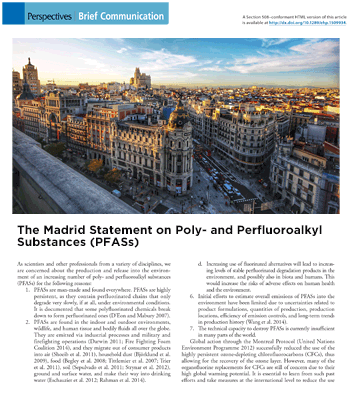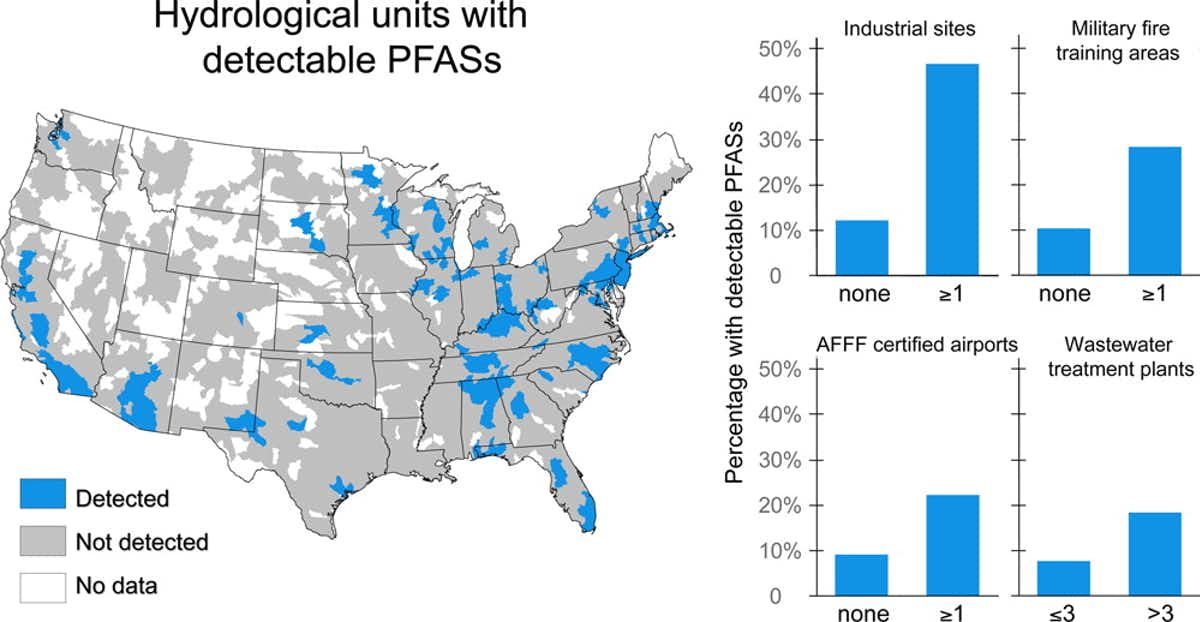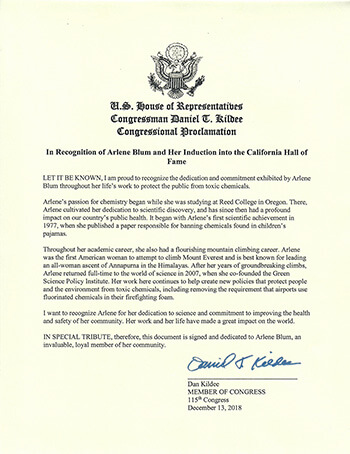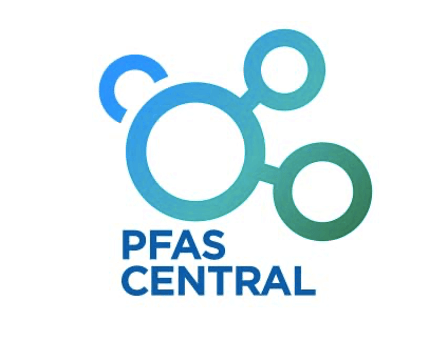PFAS
Our research and policy work helped put PFAS on the map
Per- and polyfluoroalkyl substances (PFAS) are a class of highly persistent industrial chemicals. Well-studied PFAS have been linked to health harm, and all PFAS persist indefinitely in the environment. We work to prevent PFAS pollution by publishing research, making policy recommendations, and educating decision makers.
Research
We collaborate with scientists from academia, government, business, and NGOs on research that contributes to improved regulation and reduced use of PFAS.
PFAS in U.S. drinking water
Our 2016 paper in ES&T Letters linked PFAS contamination in drinking water to sources including fluorochemical production plants, airports, and military fire training areas.
The study also calculated that 6 million U.S. residents were served by public water supplies in which concentrations of the two most extensively used PFAS, PFOS and PFOA, exceeded EPA’s health advisory level.
This paper has been viewed tens of thousands of times and has contributed to increased knowledge of PFAS-contaminated drinking water and the need for solutions.

PFAS in food packaging
Working with our collaborators, we found that about 40% of fast food packaging from around the U.S. contained fluorine (and likely PFAS). The communications campaign around our 2017 study brought these results to the public, fast food companies, and U.S. Senators, and contributed to the reduced use of PFAS in fast food packaging.
Policy
While sharing the latest research, we suggest policies to reduce exposure and harm.

The Madrid Statement
In 2015, we led development of the Madrid Statement, encouraging society to limit the production and use of the entire class of PFAS. This consensus statement was signed by over 200 scientists from around the world and catalyzed increasing awareness of the harmful properties of PFAS.
Scientists’ letter on need for coordinated PFAS health studies
We published a commentary in Environmental Health in 2017 calling for coordinated health research in PFAS-contaminated communities in the U.S. The piece was signed by leading researchers and shared with decision makers in government. Our companion op-ed in The Hill contributed to government support for studies as suggested in our commentary.
Regulating PFAS as hazardous wastes
Along with our partners at the UC Berkeley Environmental Law Clinic and five community groups from Alaska to North Carolina, we petitioned the U.S. EPA to list hundreds of PFAS as hazardous wastes under the federal Resource Conservation and Recovery Act. Our op-ed about the petition is here.
Managing PFAS as a class
We co-authored a paper with some of the top PFAS experts from academia, government, and nonprofits on the importance of adopting a class-based approach to PFAS management. The paper won a Best Paper Award from Environmental Science & Technology Letters. You can watch a two-minute animated video about the paper here.
Federal legislative work
Since 2008, we have shared with Senate and House staff the basic science on toxic chemicals and ideas to reduce harm. Our educational work on PFAS includes regular Hill visits and monthly webinars. As a result, several of our ideas to limit the use of PFAS and protect communities’ health have been enacted into law with bipartisan support.
Education
We educate decision makers about limiting unnecessary uses of PFAS through workshops, talks, and webinars.
Collaborative workshops
We convene multi-stakeholder workshops to educate companies about PFAS and other chemical classes of concern. These meetings have contributed to the carpet, outdoor, and fast food industries’ decisions to move toward PFAS-free products.
Press
We increase the impact of our scientific papers and policy work with press releases and media interviews.
PFASCentral.org
In 2019 we launched PFASCentral.org, a curated source for the latest news, science, policy, and opportunities related to PFAS. The website also hosts a regularly updated list of PFAS-free products and the PFAS Data Hub which provides quick access to a breadth of publicly available PFAS data sources.
Talks and webinars
We share information on PFAS through talks at scientific, governmental, and industry meetings.
Resources
Our websites:
Science:
- PFAS Data Hub
- The scientific basis for managing PFAS as a chemical class
- Per- and polyfluoroalkyl substances in paired dust and carpets from childcare centers
- Proposal for coordinated health research in PFAS-contaminated communities in the United States
- Fluorinated compounds in U.S. fast food packaging
- Reducing human exposure to highly fluorinated chemicals to protect public health
- Detection of poly- and perfluoroalkyl substances (PFASs) in U.S. drinking water linked to industrial sites, military fire training areas, and wastewater treatment plants
- The Madrid Statement on poly- and perfluoroalkyl substances


